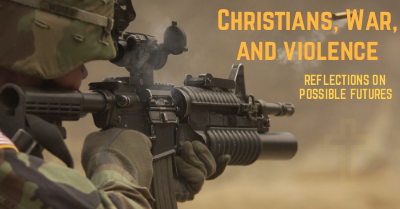|
My blog posts revolve around my interests and vocation as a historian: the intersection of history and contemporary church life, the intersection of history and contemporary politics, serendipitous discoveries in archives or on research trips, publications and research projects, upcoming conferences, and speaking engagements.
I sometimes blog for two other organizations, the Canadian Baptist Historical Society and the Centre for Post-Christendom Studies. The views expressed in these blogs represent the views of the authors, and not necessarily those of any organizations with which they are associated. |
|
British historian David Cannadine has rightly stated, “The older I get the more I’m convinced that it’s the purpose of politicians and journalists to say the world is very simple, whereas it’s the purpose of historians to say, ‘No! It’s very complicated.’” If you think getting to the truth is complicated in peacetime, it is even worse in of times of war. The following are some final thoughts on the media and war. More specifically, there are three periods and two issues that need to be noted. Three Periods
There are three very obvious stages to the media’s coverage of war: before, during, and after a conflict. Each stage has unique features, pressures, and intentions, and media must be understood with those contexts in mind:
Two Issues 1. Complexity Only a fool or partisan hack (sometimes one and the same) reads wartime media without recognizing the complexity at hand. While being in a democracy rather than a dictatorship makes for a more relatively trustable media, even in democracies wartime governments invoke measures that include censorship.[1] Perhaps one particular danger in democracies is the naivety of citizens who believe that their government and media can be trusted. In any case, the following is a list of some considerations related to complexity and wartime media:
The realty of these complexities requires considerable and careful due diligence among media consumers. However, despite how these complexities cloud issues, perhaps an even greater influence on how Christians “get to the truth” in media is related to their pre-conceived loyalties and how those loyalties cloud their vision. 2. Loyalties Christians have two foremost dual loyalties; one is their Christian identity, the other is their national identity. Both evoke strong emotions and both appeal to identities deeply rooted in history, tradition, family, and ethnicity. Both are legitimate to hold and to celebrate, yet they are not equal in claims of allegiance. Some churches have the Christian flag and the national flag on the platform or dais, mounted side by side, at the same height, as a visual recognition of such dual loyalties. The problem with such a display is that Christians have often misunderstood or ignored the fact that those dual allegiances should not have an equal appeal in terms of allegiance. To use a modern phrase, Christians have dual citizenship: good citizens, appreciative of nation, loyal to the rulers, but their ultimate loyalty lay elsewhere. Or, stated more succinctly, “Jesus is Lord, Caesar is not.” And Christians must engage wartime media with these competing loyalties in mind. Even in the midst of “jingoism.” The word “jingoism” comes from the chorus in a tune sung in late-Victorian British pubs and music halls as concerns rose in Britain over Russia’s advances against the Ottomans: “We don’t want to fight, but jingo if we do, we got the ships, we got the men, we got the money too.” Jingoism is the phenomenon of a zealous passion for war, a zeal for battle, and a decidedly uncritical appraisal of the justice of the cause and the horrors of combat. In other words, a mindless but zealous hyper-patriotism. It is marked by such conduct as shouting down opponents, drowning out opposition in parliament by singing the national anthem, mass demonstrations in the street, intense polarization of political opinions, ardent enthusiasm for enlistment, and woefully biased media. So what is to be done?
It is sometimes easier to “just drink the Kool Aid”,[3] wave the flag, pay the party dues, and believe whatever you read or hear in the media. But the Christian way requires more. In the words of David Bentley Hart, “It is good to be reminded from time to time – good for Christians, that is – that their relations with the liberal democratic order can be cordial to a degree, but are at best provisional and fleeting, and can never constitute a firm alliance; that here they have no continuing city; that they belong to a kingdom not of this world; and that, while they are bound to love their country, they are forbidden to regard it as their true home.” (This is blog post #4 in the series entitled “Christians, War, and Violence: Reflections on Possible Futures”.) [1] Even in peacetime censorship can be a problem in a democracy. See https://www.thoughtco.com/how-media-censorship-affects-the-news-you-see-2315162 [2] In many cases, the information can only be made available in archives in the decades following the war. See https://www.smithsonianmag.com/smart-news/nixon-prolonged-vietnam-war-for-political-gainand-johnson-knew-about-it-newly-unclassified-tapes-suggest-3595441/ [3] Sadly, many assume that the other side has “drunk the Kool Aid” and have never considered the possibility that maybe they have too – just a different colour.
1 Comment
|
Archives
May 2024
|

 RSS Feed
RSS Feed
